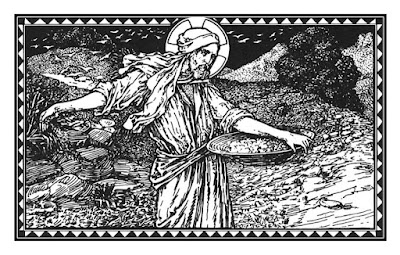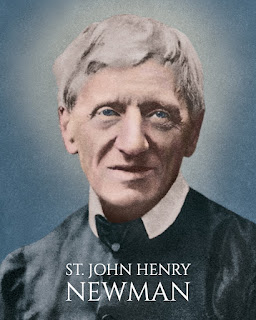On
Monday, February 14, Anna Mitchell and I will continue our series of segments on seasonal sermons by St. John Henry Newman on the Son Rise Morning Show. We'll be on the air at my usual time, about 6:50 a.m. Central/7:50 a.m. Eastern time. Please listen live on EWTN Radio or on your local EWTN affiliate.Our next sermon is for Sexagesima Sunday, "The Calls of Grace", which Newman delivered on Sunday, February 27, 1848. In this sermon, Newman considers the Parable of the Sower (Luke 8:4-15), providing a quick summary of the imagery and meaning of the parable:
In the parable of the Sower, which has formed the Gospel for this day, we have set before us four descriptions of men, all of whom receive the word of God. The sower sows first on the hard ground or road, then on the shallow earth or rock, then on a ground where other seeds were sown, and lastly on really good, rich, well-prepared soil. By the sower is meant the preacher; and by the seed the word preached; and by the rock, the road, the preoccupied ground, and the good soil, are meant four different states of mind of those who hear the word. Now here we have a picture laid out before us, which will, through God's mercy, provide us with a fitting subject of thought . . .
While the title highlights the calls of grace, what Newman really considers is how those calls of grace, the love God wants to share with us, are often answered with hardness of heart and rejection, as in the case of the Seed of the Word of God scattered on the side of the road: "some fell by the road and was trodden down and the birds of the heaven ate it up." (verse 12)
The word goeth forth, as the prophet Isaias says, and does not return unto Him void, but prospers in the thing whereto He sends it. Nothing can stop it, but a closed heart. Nothing can resist it, but a deliberately worldly, carnal and godless will—and such a will can. But where the heart is ever so little softened, the divine word enters it; where it is not softened, it lies on the surface. It lies on the surface and we learn from the parable the immediate consequence: "the birds of the air stole it away." It did not lie there long. There was but the alternative—it was admitted within, or the wind or the birds or the foot of the passer-by, as it might be, destroyed it.
Newman doesn't emphasis this, but he's alluding to the great mystery that God does not make us love Him, obey Him, worship Him: we have free will. We can reject His love and His Commandments. We are free to love Him and we are free to reject Him!
Instead, Newman provides the gentle warning to his congregation that they shouldn't think this hardness of heart exists only in others:
Now I can fancy some of those who hear me thinking that this is an extreme case—when perhaps it is their own. When they read or hear this picture of the seed falling on the hard wayside, they may hear it in an unconcerned way, as if they had not interest in it, when they may have a great concern in the description.
Then he provides us with examples of this hardness of heart, even on a person's deathbed:
But you see the difference between one whose heart is hard, and one whose heart is softened. One man has often thought about religion, another never. The latter will be interested enough if you speak to him of things connected with this world, if you talk only of how to raise crops or how to make money in any way, or of any worldly amusement or pleasure, his attention is arrested at once. But if you speak to him about the four last things, about heaven or hell, death or judgement, he stares or laughs out. If you speak good and holy words to him, he hears and forgets. This is the dreadful case with many at death; religious persons say what they can to touch the dying man and the poor patient hears indeed, but hears without emotion, without thought of any kind. The words fall off, and have no effect—and so he dies.
His second example hearkens back to the description of the parable:
You will observe that, in the parable, not only did the fowls carry off the word of life, but the foot of the passer-by trampled it. I have hitherto spoken of those who were ignorant, careless and heartless, and from whom the devil stole the divine treasure, while they let it lie on the surface of their minds. But there are others who are worse than this; who, as it were, trample on the divine words. Such are those who feel a disdain and hatred of the truth. It is an awful thing to say, but we see it before our eyes how many people there are who hate the doctrine which Christ revealed and the Church teaches. Of course many do so in mere ignorance, and would feel and act otherwise, if they had the opportunity. But there are those, and not a few, who scorn and are irritated at the preaching of the word of life, and spurn it from them.
And his third:
But I will now go on to mention a third case of hardness of heart, which not infrequently occurs, and that is, the case of those who get familiar with the word of life and then are not moved by it. When persons who are living in sin hear for the first time the sound of Catholic truth, they are affected by it; it is something new and the novelty of the doctrine is God's instrument. It is blest by God, to make an effect upon them. It moves and draws them. And then the worship of the Catholic Church is so overcoming—the holy forms, the sacred actions, the awful functions (Benediction, for instance), subdue them. They, as it were, give up, they surrender themselves to God, they feel themselves in the hands of their Saviour. They are led to cry out: "Take me, make what Thou wilt of me." This lasts for some time, and in a number of cases, praised be God, it ends happily; this excitement and transport of mind leads on to a lasting conversion. But in other cases it does not. A person is moved for a while, and then the excitement goes off. I have seen cases of this kind—many people may know them. A man is on the point of making a real conversion; he is on the point of taking up religion seriously. He is on the point of putting one and one object alone before him as the end of his being and the aim of his life, to please God and save his soul. But all of a sudden a change comes over him. Almost while we turn our head and look another way, it has taken place. We look back to him and he is quite another man—or rather he is the same, the same as he was. He has lapsed into his old forgetfulness of religion, and when he has once relaxed, it is impossible to move him. There he is for ever.
I don't think that Newman is denying that there is hope for these people, these images of the kind of thoughts and actions he has seen during his life as a pastor of souls (remember that he had been an Anglican minister for almost 20 years), serving people from womb to tomb, encouraging conversion, watching over them, seeing progress and improvement, and sometimes being very disappointed when he saw those efforts fail. Newman has witnessed even the ultimate hardness of heart when a person says that religion is a matter for children and that he or she is too adult to believe in what should be considered mere fairy tales--and that person seems to be unreachable.
Finally, Newman addresses his congregation, some of whom may now be wondering about their own hardness of heart. He urges them to ask God for the grace of conversion, to persevere in such prayers, and to observe traditional Catholic devotion, to the Blessed Sacrament, to daily Mass, to simple acts of faith, hope and love:
And if you are conscious that your hearts are hard, and are desirous that they should be softened, do not despair. All things are possible to you, through God's grace. Come to Him for the will and the power to do that to which He calls you. He never forsakes anyone who calls upon him. He never puts any trial on a man but He gives Him grace to overcome it. Do not despair then; nay do not despond, even though you do come to Him, yet are not at once exalted to overcome yourselves. He gives grace by little and little. It is by coming daily into His presence, that by degrees we find ourselves awed by that presence and able to believe and obey Him. Therefore if any one desires illumination to know God's will as well as strength to do it, let him come to Mass daily, if he possibly can. At least let him present himself daily before the Blessed Sacrament, and, as it were, offer his heart to His Incarnate Saviour, presenting it as a reasonable offering to be influenced, changed and sanctified under the eye and by the grace of the Eternal Son. And let him every now and then through the day make some short prayer or ejaculation, to the Lord and Saviour, and again to His Blessed Mother, the immaculate most Blessed Virgin Mary, or again to his guardian Angel, or to his Patron Saint. Let him now and then collect his mind and place himself, as if in heaven, in the presence of God; as if before God's throne; let him fancy he sees the All-Holy Lamb of God, which taketh away the sin of the world.
And he ends with this beautiful reminder that this is the way to become a saint:
These are the means by which, with God's grace, he will be able in course of time to soften his heart—not all at once, but by degrees; not by his own power or wisdom, but by the grace of God blessing his endeavour. Thus it is that Saints have begun. They have begun by these little things, and so become at length Saints. They were not saints all at once, but by little and little. And so we, who are not saints, must still proceed by the same road; by lowliness, patience, trust in God, recollection that we are in His presence, and thankfulness for His mercies.
Saint John Henry Newman, pray for us!


No comments:
Post a Comment